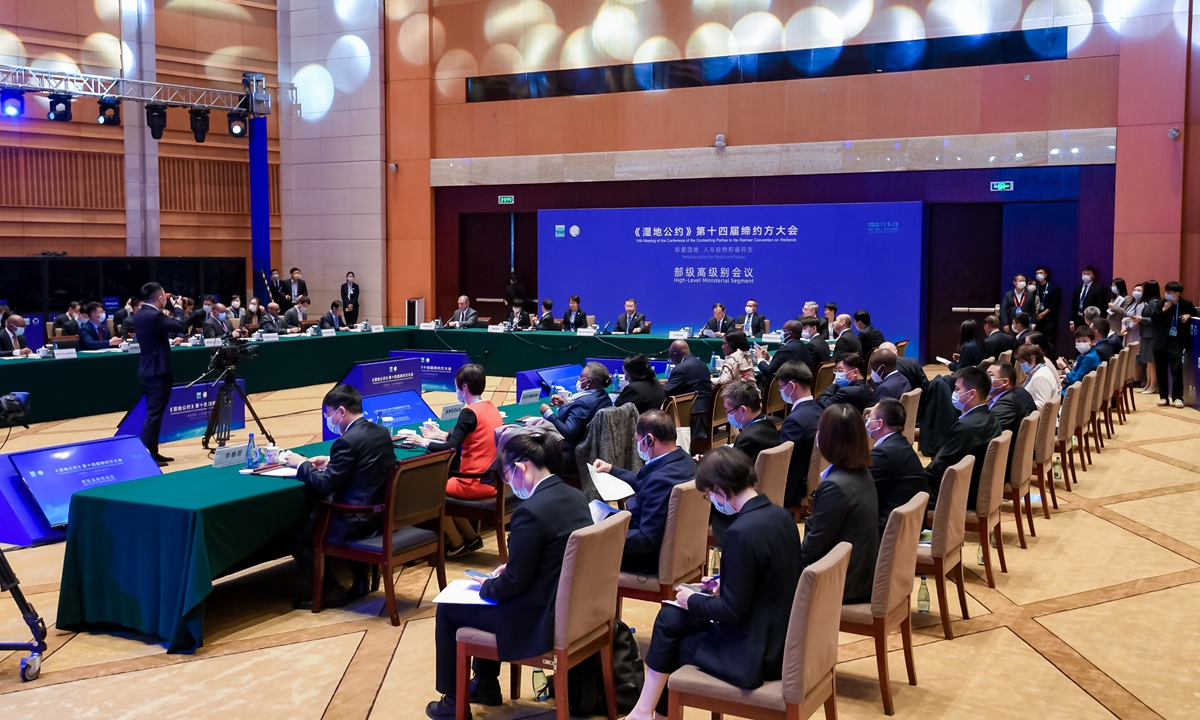
The 14th Meeting of the Conference of the Contracting Parties to the Ramsar Convention on Wetlands (COP14) on Sunday in Wuhan. Photo: Courtesy of COP14
International delegates expressed expectations for China's continued contribution of solutions and wisdom on wetlands protection, as the Wuhan Declaration calling for "strong will and practical actions" on wetlands conservation was adopted Sunday at the 14th Meeting of the Conference of the Contracting Parties to the Ramsar Convention on Wetlands (COP14), which is being held in Central China's Wuhan and Switzerland's Geneva this week.
The declaration, one of the main fruits of the COP14, aims to promote the conservation, restoration, management, and wise and sustainable use of wetlands, and to prevent and mitigate the systematic risks arising from the continuing loss and degradation of wetlands worldwide.
This year marks the 30th anniversary of China's accession to the Ramsar Convention. China leads the world in having the most international wetland cities, being home to 13 among all 43 cities globally. With 4 percent of the world's wetlands, China meets the ecological, productional, living and cultural needs of one-fifth of the world's population, Chinese Foreign Ministry spokesperson Zhao Lijian said at a press meeting on Monday.
Protecting and developing wetlands are a common task for the whole world, and the Wuhan Declaration has become an important document to build consensus and demonstrate global will, said Zhao.
Observers said the declaration embodies China's experience and wisdom over the past 30 years of implementing the convention, as well as highlights China's efforts in wetland protection, which shows China has grown from a participant, to a contributor, to now a leader in global wetland preservation.
China believes that the COP14 will be a new starting point for all countries to work together to promote global wetland conservation, Zhao noted.
Musonda Mumba, secretary-general of the Ramsar Convention, underlined China's strong leadership in wetlands conservation. She said that the Chinese government has honored its commitment to increase input in wetland protection, demonstrating with concrete actions the importance it attaches to ecosystem protection, said Zhao, noting the situation in China is encouraging.
Chinese President Xi Jinping called for advancing global process on wetlands conservation, redoubling efforts to preserve authenticity and integrity, and scaling up wetlands action across the world in an address to the opening ceremony of COP14 on Saturday via a video link.
Venezuelan Ambassador to China Giuseppe Yoffreda told the Global Times at the opening ceremony of COP14 that he had the honor of listening to President Xi's speech which defines what is the priority for China in wetlands protection in a clear and forceful way.
Giuseppe Yoffreda said he was impressed by the importance of environmental protection attached by China, and he expressed confidence for more cooperation between China and Venezuela on wetlands ecosystem protection.
Jean-Yves Roux, consul general of France in Wuhan, told the Global Times that Chinese philosophy advocating the harmony of humanity and nature has been better accepted by people around the world.
He said he is impressed by the remarkable achievements in wetland protection, and feel great importance China has attached to protect wetlands and high aspirations for its plan. He is confident for China's future solutions and contributions in this area.
The Ramsar Convention, named after the city of Ramsar in Iran, where the convention was signed in 1971, is an intergovernmental agreement dedicated to the conservation and rational use of wetland ecosystems. To date, it has 172 contracting parties, the Xinhua News Agency reported.
China joined the convention on July 31, 1992 and designated seven wetland sites as the "Wetlands of International Importance" (known as Ramsar sites). Currently, China's wetland area is 56.35 million hectares, ranking first in Asia and fourth in the world.
The Global Times learned from the COP14 that in the past decade, China has restored and developed more than 800,000 hectares of wetlands, and now has 64 wetlands of international importance, 29 wetlands of national importance and 13 international wetland cities, ranking first in the world.
"Wuhan is well known as the city of rivers, rich species and birds, and it is really a model and represents what investments China has put in the wetland conservations," Ali Obaid Al Dhaheri, the UAE's ambassador to China, told the Global Times at the ceremony of COP14.
He said that achievements of Wuhan's urban wetland ecological protection are an epitome of China's overall wisdom on the cause.




